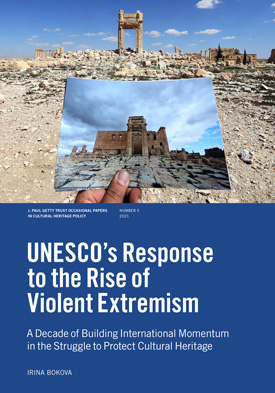
UNESCO’S Response to the Rise of Violent Extremism: A Decade of Building International Momentum in the Struggle to Protect Cultural Heritage
Irina Bokova
2021
36 pages
PDF file size: 1.5 MB
Description
In 2016, in response to recent attacks on cultural heritage sites in Syria, Iraq, and Timbuktu, the J. Paul Getty Trust convened a meeting at the British Academy in London to discuss the need for an international framework to protect cultural heritage in zones of armed conflict. To further explore these questions, the Trust subsequently launched the J. Paul Getty Trust Occasional Papers in Cultural Heritage Policy series.
The fifth issue of this series, written by Irina Bokova, former director-general of UNESCO, focuses on the value that UNESCO can bring to the fight to protect cultural heritage. During her two terms at UNESCO, Bokova worked to promote international peace and cooperation by raising awareness of the value of cultural heritage and partnering with local communities to rebuild and revitalize their damaged heritage—and themselves. One of Bokova’s most successful campaigns, #Unite4Heritage, has created a global social network of people who are sharing stories, knowledge, and personal experiences about their heritage in an effort to challenge the hate-filled narratives put forward by extremists and keep threatened cultures alive and vital.
Table of Contents
- Foreword
- Introduction
- The Rise of Violent Extremism
- UNESCO’s Response: Three Lines of Action
- Culture, Heritage, and the UN 2030 Agenda for Sustainable Development
- Conclusion
- Notes
- About the Author
About the Authors
Born in Sofia, Bulgaria, Irina Bokova was the director-general of UNESCO for two terms, from 2009 to 2017. She is the first woman to lead the organization. As director-general, Bokova was actively engaged in the UN efforts to adopt Agenda 2030 for Sustainable Development, focusing on quality education, gender equality, the role of culture in sustainable development, and the protection of the world’s cultural heritage. She has been particularly active in the defense of cultural heritage against its deliberate destruction by extremists, which led to the 2017 adoption of the landmark United Nations Security Council Resolution 2347.
After graduating from the Moscow State Institute of International Relations, Bokova was a fellow at the University of Maryland, Washington, and participated in an executive program at the John F. Kennedy School of Government at Harvard University.
Before being elected director-general of UNESCO, from 2005 to 2009 Bokova was ambassador of Bulgaria to France, Monaco, and UNESCO, and personal representative of the President of the Republic of Bulgaria to the Organisation Internationale de la Francophonie (OIF).
Currently, Bokova is a member of the board of the Ban Ki Moon Centre for Global Citizens; member of the Concordia Leadership Council; member of the Strategic Committee of the Paris School of International Affairs (PSIA, SciencePo); lecturer on cultural diplomacy, Honorary Dean of the Humanitas College and Miwon Scholar of Peace Studies at Kyung-Hee University, Seoul; visiting lecturer at the University of Geneva; and member of the board of L’Institut de relations internationales et stratégiques (IRIS), Paris, among other activities.
For her leadership and service, Irina Bokova has received state distinctions from countries across the world and has been awarded an honoris causa degree from more than forty universities. She was also on the Forbes list of the world’s most influential women for 2016. In 2020 she was elected international honorary member of the American Academy of Arts and Sciences.